
Arabic_for_Dummies
.pdf
266 Part III: Arabic on the Go
Murad: hunaaka shaaTi’ fii ad-daar al-bayDaa’ li ‘anna al-madiina qariiba min al-muHiiT al-’aTlassii. hoo-nah-kah shah-teeh fee ah-dar al-bay-dah lee ah-nah al-mah-dee-nah kah-ree-bah meen al-moo-heet al-at-lah-see.
There is a beach in Casablanca because the city is located near the Atlantic Ocean.
Stephanie: jamiil. jah-meel.
Beautiful.
Murad: wa murrakush laysa fiihaa shaaTi’ wa laakin hunaaka jabal al-’aTlas qariib minhaa.
wah moo-rah-koosh lay-sah fee-hah shah-teeh wah lah-keen hoo-nah-kah jah-bal al-at-las kah-reeb meen-hah.
There is no beach in Marrakech, but it is located near the Atlas Mountains.
Stephanie: wa hal yumkin ‘an natazallaj fii jabal al-’aTlas? wah hal yoom-keen an nah-tah-zah-laj fee jah-bal al-at-las?
And is it possible to ski in the Atlas Mountains?
Murad: na’am. jabal al-’aTlas ‘akbar jabal fii shamaal
‘afriiqiyaa wa fii as-sharq al-’awSaT. hunaaka kathiir min ath-thalj fiih.
nah-am. jah-bal al-at-las ak-bar jah-bal fee shah-mal af-ree-kee-yah wah fee ah-shah-rek al-aw-sat. hoo-nah-kah kah-theer meen ah-thah-lej feeh.
Yes. The Atlas Mountains is the biggest mountain range in North Africa and in the Middle East. There is plenty of snow there.
Stephanie: haadhaa ‘ikhtiyaar Sa’b jiddan. hah-zah eek-tee-yar sahb jee-dan.
This is a very difficult choice.

Chapter 15: Planning a Trip 267
Murad: hal sa-tadhhabiina ma’a usratuki?
hal sah-taz-hah-bee-nah mah-ah oos-rah-too-kee?
Are you going to go with your family?
Stephanie: na’am. ma’a zawjii wa ‘ibnii.
nah-am. mah-ah zaw-jee wah eeb-nee.
Yes. With my husband and son.
Murad: kam ‘amr ‘ibnukii?
kam ah-mer eeb-noo-kee?
How old is your son?
Stephanie: ‘ashr sanawaat. ah-sher sah-nah-wat.
Ten years old.
Murad: ‘aDHunn ‘anna murraakush tuwaafiq riHla li al-’usra.
‘ibnukii sayuHibbuhaa.
ah-zoon ah-nah moo-rah-koosh too-wah-feek reeh-lah lee al-oos-rah. eeb-noo-kee sah-yoo-hee-boo-hah.
I believe that Marrakech is suitable for a family trip. Your son will like it.
Stephanie: Tayyib sa nadhhab ‘ilaa murrakush. wa laakin ‘uriidu
‘an ‘adhhab ‘ilaa ad-daar al-bayDaa’ ‘ayDHan. hal haadha mumkin?
tah-yeeb sah naz-hab ee-lah moo-rah-koosh. wah lah-keen oo-ree-doo an az-hab ee-lah ah-dar al-bay-dah ay-dan. hal hah-zah moom-keen?
Okay, we’ll go to Marrakech. But I’d like to go to Casablanca as well. Is this possible?
Murad: na’am. haadhaa ‘aHsan ‘idhaa zurtum murrakush wa ad-dar al-bayDaa’.
nah-am. hah-zah ah-san ee-zah zoor-room moo-rah-koosh wah ah-dar al-bay-dah.
Yes. It’s better if you visit both Marrakech and Casablanca.
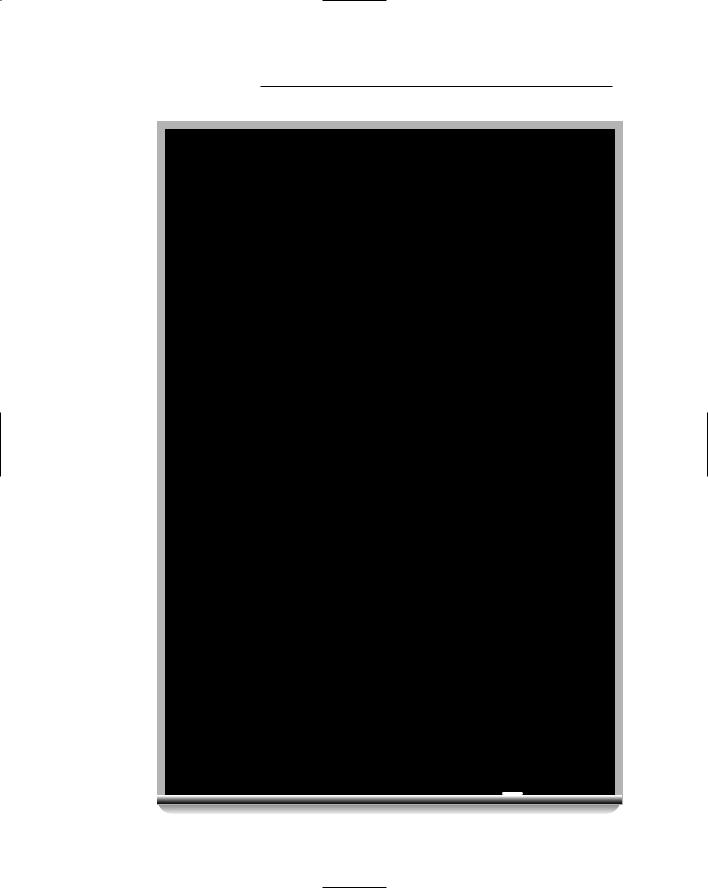
268 Part III: Arabic on the Go
Words to Know
zawj |
zah-wej |
husband |
zawja |
zaw-jah |
wife |
fikra |
feek-rah |
idea |
naSiiHa |
nah-see-hah |
recommendation |
daafi’ |
dah-feeh |
warm |
baarid |
bah-reed |
cold |
makaan |
mah-kan |
place |
‘afDal |
af-dal |
preferable |
ziyaara |
zee-yah-rah |
visit |
mundhu |
moon-zoo |
during/throughout |
madiina |
mah-dee-nah |
city |
mudun |
moo-doon |
cities |
shaaTi’ |
shah-teeh |
beach |
muHiiT |
moo-heet |
ocean |
sibaaHa |
see-bah-hah |
swimming |
jabal |
jah-bal |
mountain |
jibaal |
jee-bal |
mountains |
thalj |
tah-lej |
snow |
tazalluj |
tah-zah-looj |
skiing |
shamaal |
shah-mal |
north |
januub |
jah-noob |
south |
gharb |
gah-reb |
west |
sharq |
shah-rek |
east |

Chapter 15: Planning a Trip 269
Picking the Right Time for Your Trip
A major part of travel planning is timing. When you have an idea of what you want to do or where you want to go, you need to consider the most appropriate time to take the trip. An obvious example is deciding to go skiing and making sure your mountain destination will have snow when you’re there. However, things can get trickier if you’re traveling to a Middle Eastern or Islamic country; during some months of the year, such as the holy month of Ramadan, traveling to these countries probably isn’t a good idea because the time is sacred to Muslims.
The months of the year
Look at the taqwiim (tak-weem; calendar) and choose the shahr (shah-her; month) most suitable not only to your travel plans but also to the dawla (daw-lah; country) you’re visiting. Table 15-1 identifies the months in Arabic.
Table 15-2 |
Months in Arabic |
|
Arabic |
Pronunciation |
Translation |
yanaayir |
yah-nah-yeer |
January |
|
|
|
fibraayir |
feeb-rah-yeer |
February |
|
|
|
maaris |
mah-rees |
March |
|
|
|
‘abriil |
ah-beh-reel |
April |
|
|
|
maayuu |
mah-yoo |
May |
|
|
|
yunyu |
yoo-neh-yoo |
June |
|
|
|
yulyu |
yoo-leh-yoo |
July |
|
|
|
‘aghusTus |
ah-goo-seh-toos |
August |
|
|
|
sibtambar |
see-beh-tam-bar |
September |
|
|
|
‘uktuubar |
oo-key-too-bar |
October |
|
|
|
nufambar |
noo-fahm-bar |
November |
|
|
|
disambar |
dee-sahm-bar |
December |
|
|
|
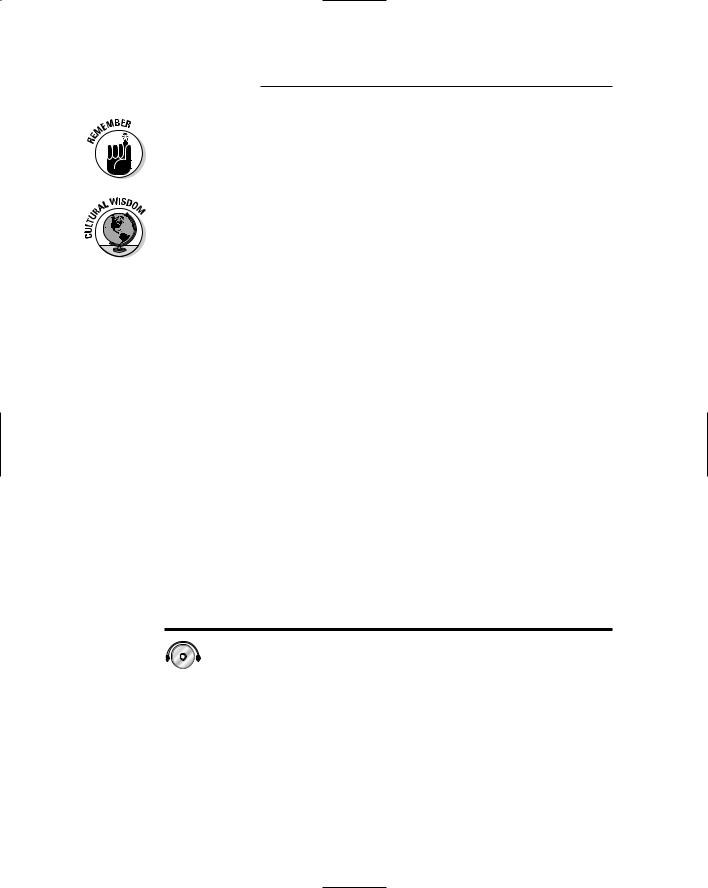
270 Part III: Arabic on the Go
There are in fact two methods of transcribing months in Arabic. The one in Table 15-2 is based on the Gregorian calendar, which is widely used in the West. The second way of identifying months is based on the Islamic lunar system. Flip to Chapter 4 to see the months listed according to the Islamic calendar.
For travel purposes, the Gregorian calendar convention is most widely used, so if you’re making a reservation, you can use the months listed in Table 15-2 to communicate the time of your riHla.
Dates and ordinal numbers
After you narrow down the shahr in which you want to take your riHla, you must specify the dates of your riHla by using numbers. Arabic numbers fall into two categories: cardinals and ordinals. Cardinals are regular counting numbers, like “one,” “two,” or “three;” ordinals are the adjective forms of numbers, like “first,” “second,” and “third.” Arabic ordinals differ from cardinals in that every ordinal number has both a masculine and feminine form. Because ordinals are treated as adjectives, they must be in gender agreement with their corresponding nouns.
When you specify a date, you say “December fifth” or “January eighth.” Because shahr is a masculine noun (the terms for months are masculine), you must use masculine ordinals to identify specific dates. For example, you say disambar al-khaamis (dee-sam-bar al-kah-mees; December fifth) or yanaayir ath-thaamin (yah-nah-yeer ah-thah-meen; January eighth). In addition, because the ordinal acts as a possessive adjective, you must include the possessive prefix al-. For more on cardinals and ordinals, flip to Chapter 4. For a comprehensive list of ordinals, flip to Chapter 12.
Talkin’ the Talk
George and his wife Selma are trying to figure out when to visit their favorite country, Morocco.
George: mataa turiidiina ‘an nadhhab ‘ilaa al-maghrib haadhihi as-sana?
mah-tah too-ree-dee-nah an naz-hab ee-lah al-mag-reeb hah-zee-hee ah-sah-nah?
When would you like us to go to Morocco this year?
Selma: fii nihaayat as-sana, kam al-’aada.
fee nee-hah-yat ah-sah-nah, kam al-ah-dah.
At the end of the year, as usual.

Chapter 15: Planning a Trip 271
George: disambar? hal yumkin ‘an tadhhabii fii disambar al-khaamis?
dee-sam-bar? hal yoom-keen an taz-hah-bee fee dee-sam-bar al-kah-mees?
December? Can you go on December fifth?
Selma: ‘intaDHir daqiiqa. sa ‘araa taqwiimii.
een-tah-zeer dah-kee-kah. sah ah-rah tak-wee-mee.
Hold on one minute. I’ll check my calendar.
Selma checks her calendar.
Selma: lisuu’i al-HaDH laa yumkin ‘an ‘adhhab disambar alkhaamis. ‘indii ‘ijtimaa’ muhimm haadhaa al-yawm. lee-soo-ee al-haz lah yoom-keen an az-hab dee-sam-bar al-kah-mees. een-dee eej-tee-mah moo-heem hah-zah al-yah-oum.
Unfortunately I’m not able to leave on December fifth. I have an important meeting that day.
George: hal yumkin ‘an tadhhabii fii disambar ath-thaamin? hal yoom-keen an taz-hah-bee fee dee-sam-bar ah-thah-meen?
Can you go on December eighth?
Selma: na’am. disambar ath-thaamin tamaam! nah-am. dee-sam-bar ah-thah-meen tah-mam!
Yes. December eighth is perfect!
George: mumtaaz! wa hal narja’ fii disambar ‘ishriin? moom-taz! wah hal nar-jah fee dee-sam-bar eesh-reen?
Excellent! And should we come back on December twentieth?
Selma: na’am haadhaa mumkin. wa laakin ‘anaa ‘uriidu
‘an ‘abqaa waqt ‘akthar. hal yumkin ‘an nabqaa ‘ilaa disambar raabi’ ‘ishriin?
nah-am hah-zah moom-keen. wah lah-keen ah-nah oo-ree-doo an ab-kah wah-ket ak-thar. hal yoom-keen an nab-kah ee-lah dee-sam-bar rah-beeh eesh-reen?
Yes that’s possible. But I’d like to stay a bit longer. Can we stay until December twenty-fourth?
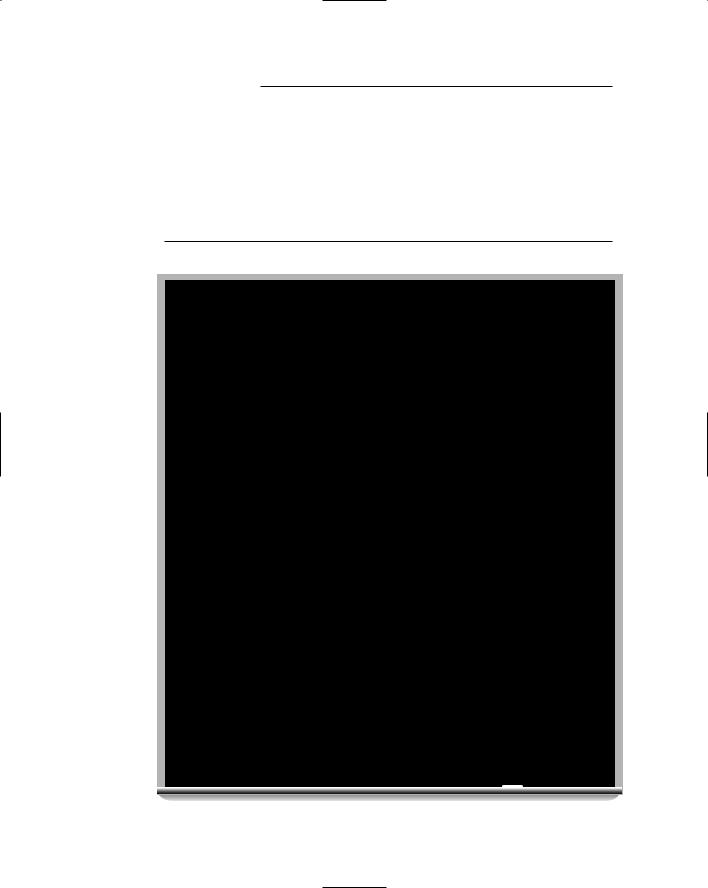
272 Part III: Arabic on the Go
George: Tayyib. nabqaa ‘ilaa raabi’ ‘ishriin.
tah-yeeb. nab-kah ee-lah rah-beeh eesh-reen.
Okay. Let’s stay until the twenty-fourth.
Selma: shukran. sa takuun riHla mutamatti’a! shook-ran. sah tah-koon reeh-lah moo-tah-mah-tee-ah!
Thank you. It’s going to be an entertaining trip!
Words to Know
dhahaba |
zah-hah-bah |
to go |
nadhhab |
naz-hab |
we go |
shahr |
shah-her |
month |
‘ashhaar |
ash-har |
months |
nihaaya |
nee-hah-yah |
end |
bidaaya |
bee-dah-yah |
beginning |
waSat |
wah-sat |
middle |
waqt |
wah-ket |
time |
taraka |
tah-rah-kah |
to leave |
raja’a |
rah-jah-ah |
to return/come back |
‘amal |
ah-mal |
work |
daqiiqa |
dah-kee-kah |
minute |
taqwiim |
tak-weem |
calendar |
‘ijtimaa’ |
eej-tee-mah |
meeting |
muhimm |
moo-heem |
important (M) |
muhimma |
moo-hee-mah |
important (F) |
tamaam |
tah-mam |
perfect |

Chapter 15: Planning a Trip 273
Tackling Packing
Packing the right items for your riHla is a crucial step toward enjoying your travel experience. First, you must gather the ‘amti’a (am-tee-ah; luggage) you need. Here are some possibilities:
shanTa (shan-tah; suitcase)
shanTaat (shan-tat; suitcases)
miHfaDHa (meeh-fah-dah; briefcase)
miHfaDHaat (meeh-fah-dat; briefcases)
kiis (kees; bag)
‘akyaas (ak-yas; bags)
kiis al-Hammamm (kees al-hah-mam; toiletry bag)
‘akyaas al-Hammaam (ak-yas al-hah-mam; toiletry bags)
Haqiiba (hah-kee-bah; small bag)
Haqaa’ib (hah-kah-eeb; small bags)
With your ‘amti’a selected, it’s time to choose what to put in the ‘amti’a. Here are some essential items you should carry with you regardless of your wujha:
malaabis (mah-lah-bees; clothes)
‘aqmisa (ak-mee-sah; shirts)
sirwaal (seer-wal; pants)
mi’Taf (meeh-taf; coat)
‘aHdiya (ah-dee-yah; shoes)
‘aHzima (ah-zee-mah; belts)
jawaarib (jah-wah-reeb; socks)
naDHaraat (nah-zah-rat; glasses)
naDHaraat ash-shams (nah-zah-rat ah-shah-mes; sunglasses)
qubba’a (koo-bah-ah; hat)
In addition to clothing and accessories, you also need grooming items. Here are some toiletries you may pack for your riHla:
shawkat al-‘asnaan (shaw-kat al-ass-nan; toothbrush)
ma’juun al-‘asnaan (mah-joon al-ass-nan; toothpaste)
mushT (moo-shet; comb)
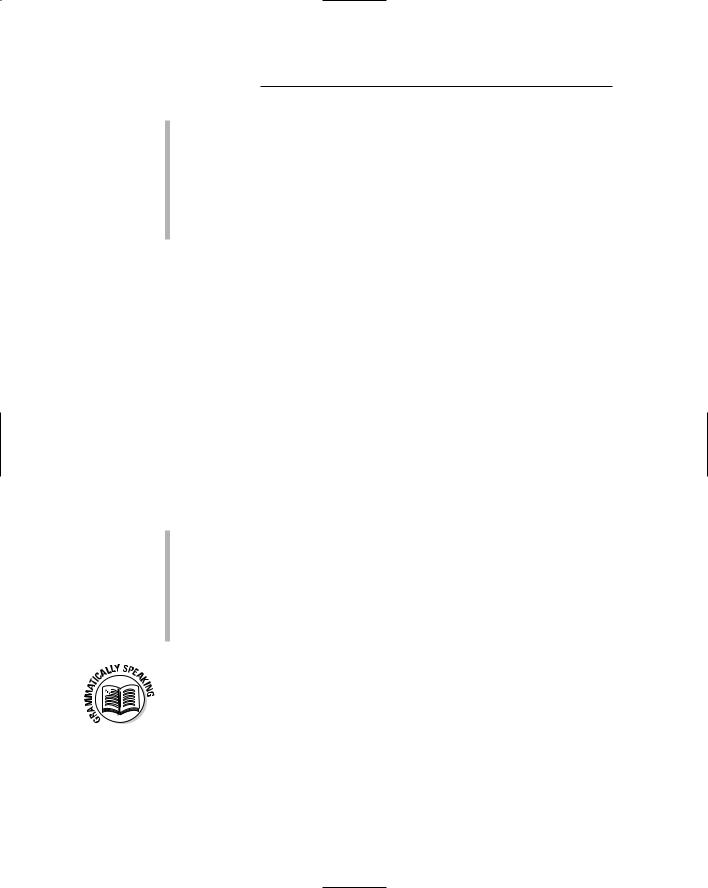
274 Part III: Arabic on the Go
ghasuul as-sha’r (gah-sool ah-shah-er; shampoo)
Saabuun (sah-boon; soap)
muziil ar-rawaa’iH (moo-zeel ah-rah-wah-eeh; deodorant)
fuuTa (foo-tah; towel)
‘aalat al-Hilaaqa (ah-lat al-hee-lah-kah; shaving razor)
ma’juun al-Hilaaqa (mah-joon al-hee-lah-kah; shaving cream)
Preparing Your Travel Documents
The logistics of travel can get pretty complicated, especially when you’re traveling internationally. In recent years, travel restrictions have grown more stringent due to growing concern over security. In this section, you can find all the key terms you need to know in order to gather the appropriate wathaa’iq assafar (wah-thah-eek ah-sah-far; travel documents) to make your riHla go as smoothly as possible.
Before you leave on a riHla, you need to have at least one biTaaqa shakhsiyya (bee-tah-kah shak-see-yah; personal identification card); to be safe, you should probably have two or more. In case you need further confirmation of your identity, carrying three forms of identification is ideal. Here are some biTaaqaat shaksiyya (bee-tah-kat shak-see-yah; personal identification cards) you could carry with you:
biTaaqat as-saa’iq (bee-tah-kat ah-sah-eek; driver’s license)
biTaaqa min al-Hukuuma (bee-tah-kah meen al-hoo-koo-mah; govern- ment-issued ID)
biTaaqa min al-jaysh (bee-tah-kah meen al-jah-yesh; military-issued ID)
jawaaz as-safar (jah-waz ah-sah-far; passport)
biTaaqat al-‘amal (bee-tah-kat al-ah-mal; work permit)
The word biTaaqa (bee-tah-kah) literally means “card.” However, its meaning may change depending on the context of the phrase in which it’s used. For instance, in the terms just listed, the word, biTaaqa means “license” as well as “permit.”
In addition to personal identification documents, if you’re traveling overseas, many countries require that you also have a ta’shiira (tah-shee-rah; visa) stamped on your jawaaz as-safar. Every dawla (daw-lah; country) has different
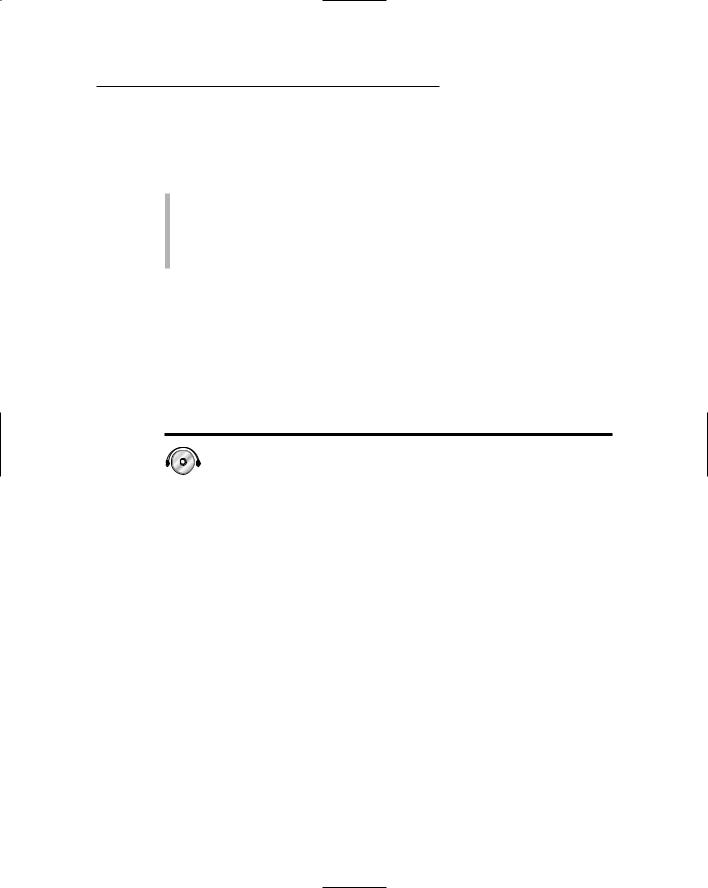
Chapter 15: Planning a Trip 275
procedures and requirements for obtaining ta’shiiraat (tah-shee-rat; visas), so it’s your responsibility to find out whether the dawla you’re planning to visit requires a ta’shiira and, if so, how to go about obtaining one. The categories of ta’shiiraat include:
ta’shiirat aT-Taalib (tah-shee-rat ah-tah-leeb; student visa)
ta’shiirat al-‘amal (tah-shee-rat al-ah-mal; work visa)
ta’shiirat as-saa’iH (tah-shee-rat ah-sah-eeh; tourist visa)
ta’shiirat al-‘usra (tah-shee-rat al-oos-rah; family visa)
In order to determine which naw’ (nah-weh; type) of ta’shiira you need and how to go about getting one, you should contact the qunSuliiyya (kon-soh- lee-yah; consulate) of your sifaaraat (see-fah-rat; embassy). If possible, arrange to speak with a muwDHaf al-qunSulliiyya (moo-wah-daf al-kon-soh- lee-yah; consular officer); he or she should be able to provide you with all the ma’lumaat (mah-loo-mat; information) you need about ta’shiiraat.
Talkin’ the Talk
Alan stops by the American consulate and speaks to a consular officer to get information about traveling to the Middle East.
Alan: sa ‘usaafir ‘ilaa ash-sharq al-’awSaT wa ‘aHtaaju ‘ilaa ma’luumaat ‘an as-safar.
sah oo-sah-feer ee-lah ah-shah-rek al-aw-sat wah ah-tah-joo ee-lah mah-loo-mat an ah-sah-far.
I’m going to be traveling to the Middle East, and I need some travel information.
Officer: Tayyib. yumkin ‘an ‘usaa’iduka. mataa sa-tadhhab? tah-yeeb. yoom-keen an oo-sah-ee-doo-kah. mah-tah sah-taz-hab?
Okay. I’m able to help you. When will you be going?
Alan: ‘uriidu ‘an ‘adhhab fii nihaayat as-sana. oo-ree-doo an az-hab fee nee-hah-yat ah-sah-nah.
I would like to go at the end of the year.
Officer: wa li kam waqt?
wah lee kam wah-ket?
And for how long?
